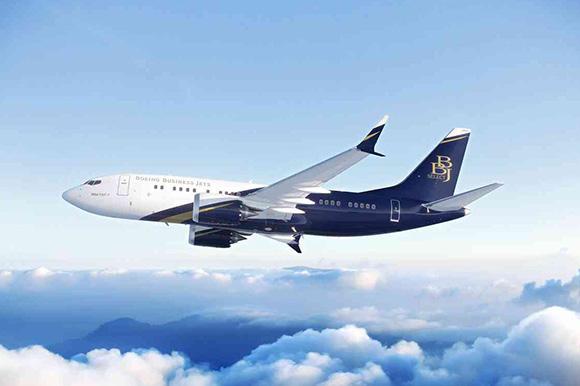
LAS VEGAS—Boeing Business Jets (BBJ) has unveiled a streamlined system for offering customized cabins for the business jet version of the 737-7 and says the initiative’s planned 2026 debut will not be impacted by the slow progress toward commercial certification of the twinjet airliner.
Announcing the BBJ Select at NBAA, company President Joe Benson says the offering is designed to make it “easy to get into the BBJ by simplifying the purchasing process. We've streamlined the engineering, the design, the build and installation processes.”
Based on the provision of 144 predesigned cabin layouts and configurations, the Select system is designed to expedite installation, while lowering the aircraft’s total purchase price. “We accomplish this through custom modules that customers can select throughout different zones in the aircraft. This enables us to not only compress the overall completion timeline, but also to drive out one-time costs and pass those savings on to our customers,” says Benson.
The modular interior options, designed in collaboration with business jet completion centers Aloft AeroArchitects and Greenpoint Technologies, include cabin combinations in three different color palettes which Boeing says can cover “the spectrum of personal, business and head-of-state airplane requirements.” BBJ says the simplified offering includes one contract with Boeing and the company which oversees the design, build and delivery of the fully outfitted aircraft.
The availability of the BBJ Select comes as Boeing nears the long-awaited certification of the 737-7. Boeing originally hoped to clinch 737-7 certification by the end of 2022, but under an updated timeline announced earlier this year now hopes to win FAA approval sometime in the next two months. The company is now thought to have completed FAA sign-off on several outstanding issues including system safety assessments containing pilot human factors assumptions.
Boeing says the earlier availability of the 737-8 based BBJ has generated more sales than expected of this larger variant, however it still expects the 737-7 variant to do well once certification is confirmed. The 737-7 is designed as the principal successor to the 737-700 which, together with the wings and other features of the heavier 737-800, formed the basis for the original BBJ1.
Although Boeing declines to specify the number of MAX-based BBJs in the orderbook, Aviation Week’s Fleet Discovery database indicates that eight are on the books, of which two are 737-7s, five are 737-8s and one 737-9. Around 110 737-based BBJs are now in service, of which three are BBJ MAX versions. The bulk of the remaining in-service fleet is made up of 737-700 BBJ1s and -800 BBJ2s, along with six 737-900 BBJ3s.
